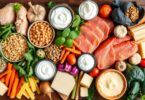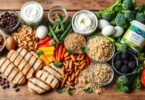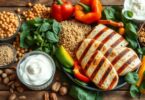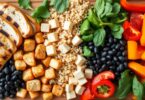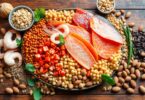Did you know the average American only consumes half the daily protein they should? This fact underscores the importance of including protein-rich foods in our diets. Protein is crucial for our bodies, aiding in tissue repair, immune function, and energy production.
In this article, we delve into the 10 best protein-rich foods essential for a balanced diet. Whether you’re an athlete, a busy professional, or seeking to enhance your health, these protein sources offer numerous benefits.
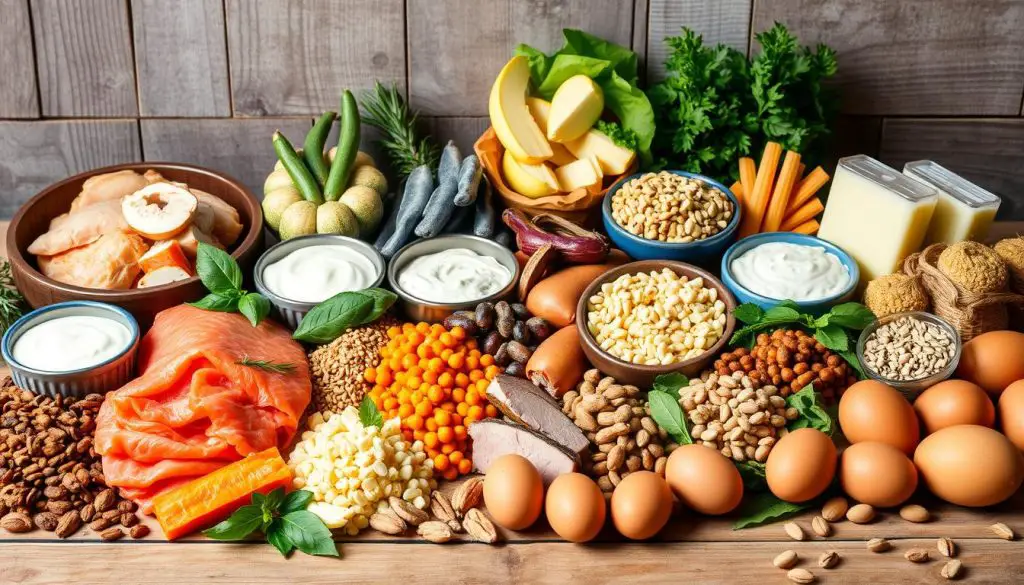
Key Takeaways:
- Protein is a vital macronutrient for muscle maintenance, immune support, and energy.
- The top 10 protein-rich foods include lean meats, eggs, fish and seafood, Greek yogurt, and plant-based options like legumes, beans, and quinoa.
- Adding a variety of protein sources to your diet ensures you meet daily protein needs and enjoy health benefits.
- Being mindful of protein content and portion sizes helps tailor your intake to your specific needs and fitness goals.
- Pairing protein-rich foods with other nutrient-dense ingredients creates balanced, satisfying meals that boost overall health.
Understanding the Importance of Protein in Your Daily Diet
Protein is a vital macronutrient crucial for maintaining health and well-being. It supports a wide range of functions in the body, from protein for health to protein for energy and protein for recovery. Knowing the importance of protein in your diet helps you make better choices. This ensures optimal protein for metabolism and protein for skin health.
Essential Functions of Protein in Body Systems
Protein is the foundation of muscles, tissues, and organs, essential for growth, repair, and maintenance. It also plays a key role in hormone, enzyme, and antibody production. These are vital for regulating bodily processes. Furthermore, protein transports essential nutrients, vitamins, and minerals throughout the body.
Recommended Daily Protein Intake Guidelines
- The recommended daily intake of protein for adults is 0.8 grams per kilogram of body weight.
- Active individuals and athletes may require higher levels of protein, ranging from 1.2 to 2.0 grams per kilogram of body weight, depending on their activity level and muscle mass.
- Pregnant and nursing women may need additional protein to support the needs of both the mother and the developing child.
Benefits of Meeting Your Protein Requirements
- Supports muscle growth and maintenance, which is crucial for protein for energy and protein for recovery.
- Helps to regulate appetite and manage weight by promoting a feeling of fullness and satiety.
- Boosts metabolism, which can aid in protein for metabolism and protein for skin health.
- Strengthens the immune system, enhancing the body’s ability to fight off infections and illnesses.
- Contributes to the development and maintenance of healthy skin, hair, and nails.
By understanding protein’s essential functions and meeting daily intake, you unlock numerous health benefits. This ensures overall well-being.
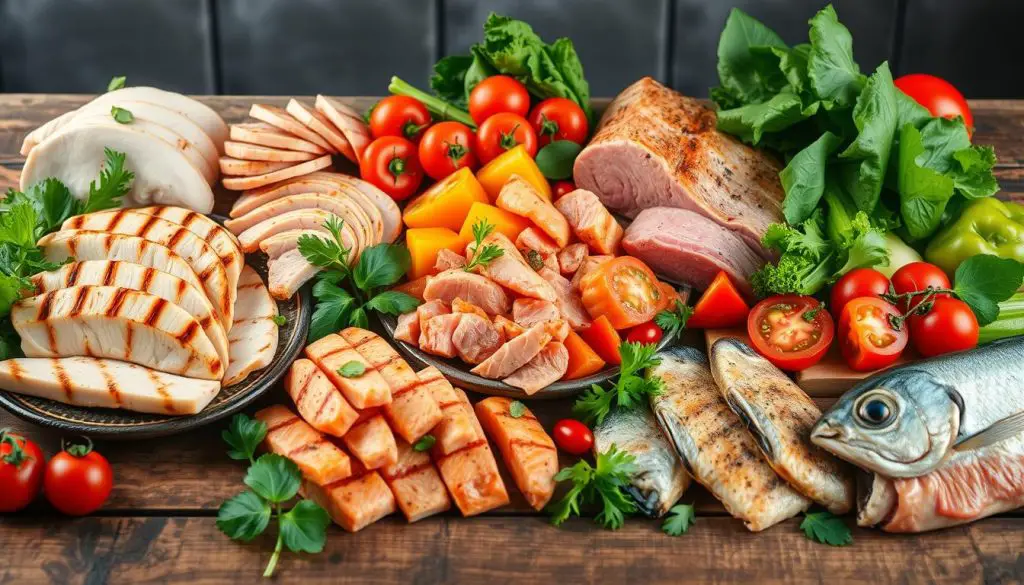
Lean Meats as Premium Sources of Complete Protein
Lean meats are top picks for a protein-rich diet. They offer complete protein and essential nutrients, boosting overall health and muscle gain.
Chicken, turkey, and pork are packed with essential amino acids. These lean meats are easy to digest, aiding in muscle repair and growth. They’re key for those aiming to protein for muscle gain.
Lean meats have low fat, making them great for a protein-focused diet. They provide the nutrients your body needs without excess calories. Choosing lean protein sources helps maintain a balanced diet.
Opt for healthy cooking methods to keep the nutritional value of lean meats. Grilling, baking, or broiling are good choices. They avoid the fats and oils found in frying or sautéing.
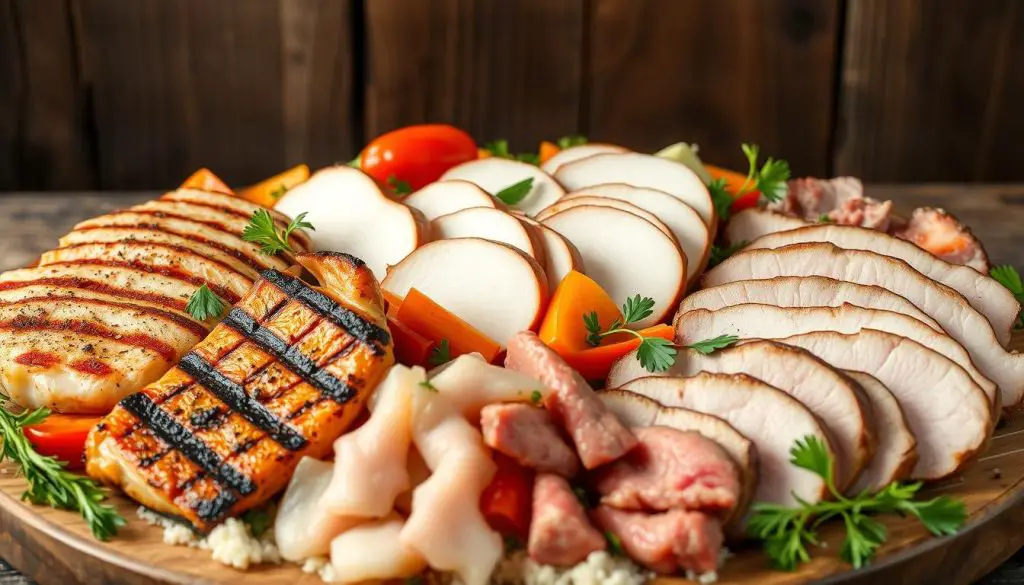
“Lean meats are an excellent source of high-quality protein that can help support muscle growth and repair, making them a crucial component of a well-balanced, protein-rich diet.”
Eggs: The Versatile Powerhouse of Protein-Rich Foods
Eggs stand out as a top-notch protein source, making them ideal for numerous dishes. They’re not just for breakfast; eggs can enhance any meal with their nutritional value. Their adaptability in both classic and innovative recipes makes them a staple in many diets.
Nutritional Breakdown of Eggs
A large egg packs about 6 grams of protein, along with key vitamins and minerals. They’re also a significant source of choline, vital for brain health. With their mix of protein, healthy fats, and essential nutrients, eggs are a protein-packed food suitable for any time of day.
Creative Ways to Include Eggs in Your Diet
Eggs are more than a morning staple; they fit into various protein food ideas and protein breakfast ideas. Add hard-boiled eggs to salads, make an egg-based frittata for lunch, or enjoy an egg sandwich for a quick, nutritious snack.
- Scrambled eggs with spinach and whole-grain toast
- Poached eggs on top of avocado toast
- Egg muffins with vegetables and cheese
- Quiche or frittata with a side of roasted vegetables
Benefits Beyond Protein Content
Eggs do more than just provide protein; they also offer numerous health benefits. The yolks are loaded with antioxidants like lutein and zeaxanthin, which are good for the eyes. They also contain vitamin D, essential for strong bones and a robust immune system.
“Eggs are one of nature’s most nutrient-dense foods, providing a wide range of essential vitamins and minerals in addition to high-quality protein.”
Looking to boost your protein intake? Eggs are a great choice for breakfast or can be added to lunch and dinner dishes. These protein-packed foods are both versatile and beneficial for a well-rounded diet.
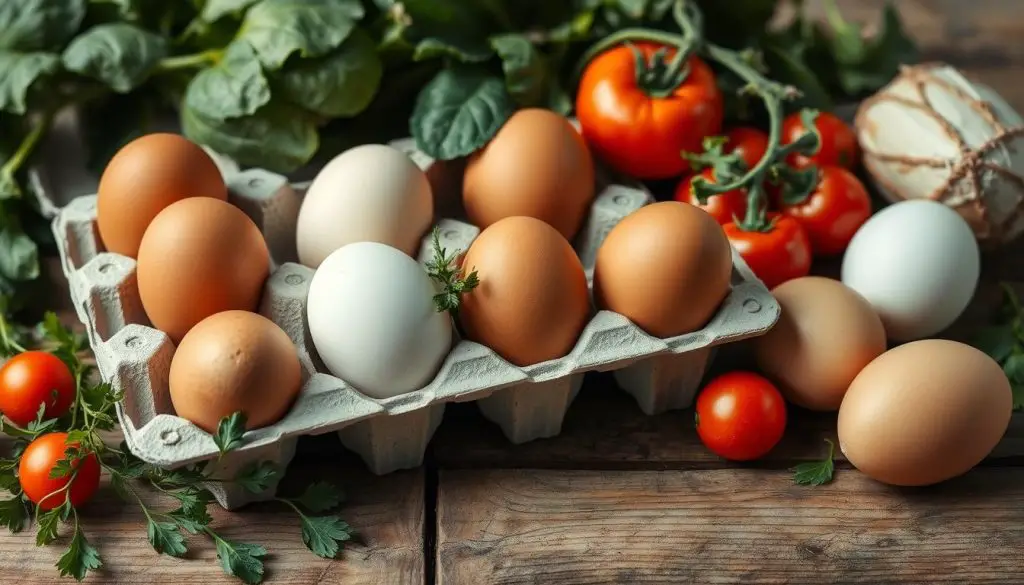
Fish and Seafood: Superior Protein Sources
Fish and seafood stand out as top protein sources. They are rich in high-quality protein, essential nutrients, and offer numerous health benefits. For athletes or health-conscious individuals, adding seafood to your diet is a smart move.
From salmon to shrimp, fish and seafood have impressive protein levels. These protein-rich foods are vital for muscle building and repair. They also support overall well-being with their diverse nutritional benefits.
Exploring the Protein Powerhouses of the Sea
Here are some top protein-rich seafood options and their nutritional profiles:
- Salmon – With 22 grams of protein per 3.5-ounce serving, salmon is a top choice for athletes and health enthusiasts.
- Tuna – Whether canned or fresh, tuna offers 26 grams of protein per 3.5-ounce portion. It’s a convenient protein-rich meals option.
- Shrimp – Despite their small size, shrimp pack 24 grams of protein per 3.5-ounce serving. They are a great food high in protein.
- Cod – Cod provides 20 grams of protein per 3.5-ounce fillet. It’s a lean choice for fitness enthusiasts.
Fish and seafood offer more than just protein. They are also rich in omega-3 fatty acids, vitamins, and minerals. Adding these protein-rich foods to your diet can significantly improve your fitness goals and overall health.
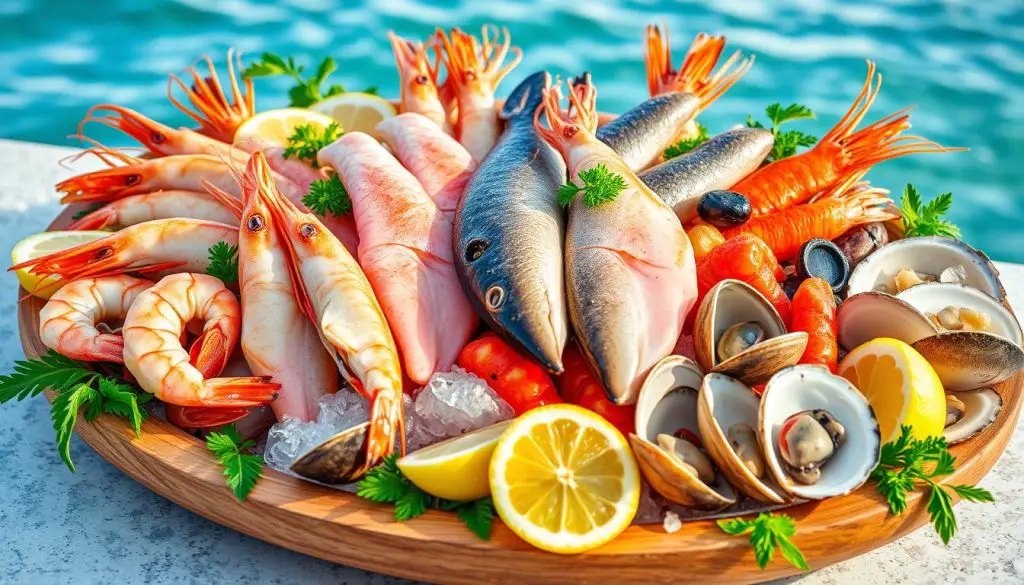
Greek Yogurt and Dairy Products for Protein Enhancement
Dairy products, especially Greek yogurt, are key for boosting protein intake. These creamy, protein-rich options are a delightful way to support fitness goals and weight management. They play a crucial role in your diet.
Comparing Protein Content in Different Dairy Options
Not all dairy products are equal in protein content. Greek yogurt is a standout, offering up to 20 grams of protein per serving. Traditional yogurt has 5-10 grams. Cottage cheese, with 12-14 grams of protein per half-cup, is another excellent protein food option. Milk, both dairy and plant-based, provides about 8 grams of protein for weight loss per cup.
Best Times to Consume Dairy Protein
- As a protein-rich snack to curb hunger and fuel your body between meals
- Paired with fresh fruit or nuts for a balanced, high-protein snack
- Blended into a protein-packed smoothie for a nutritious breakfast or post-workout recovery drink
- Incorporated into meals, such as in a protein-rich omelette or a Greek yogurt-based dressing for salads
Incorporating dairy into your diet ensures your body gets a steady supply of high-quality protein. This supports your overall health and weight management goals.
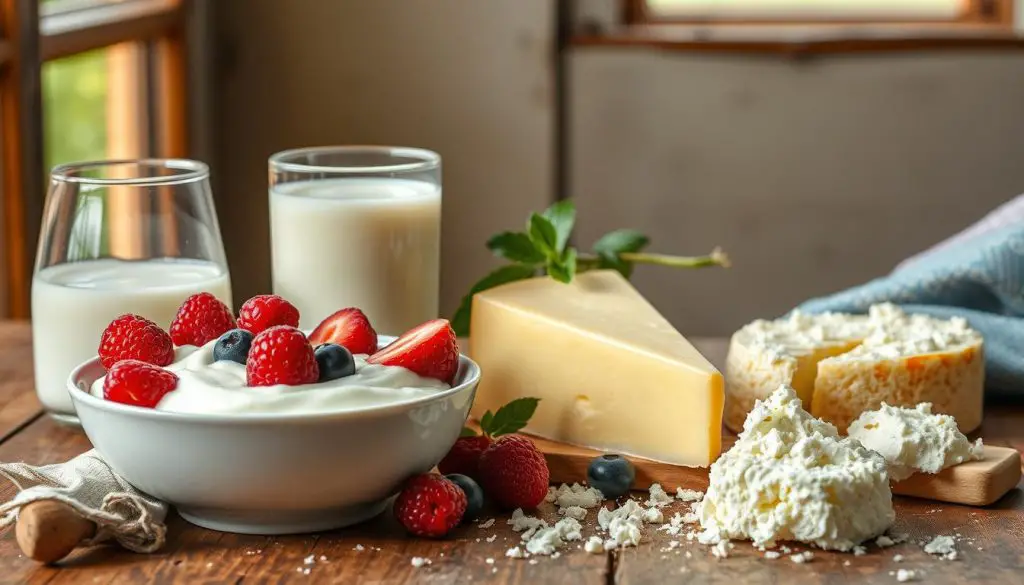
Plant-Based Proteins for Vegetarian and Vegan Diets
For those on a vegetarian or vegan diet, getting enough protein can be a challenge. Yet, the plant world is rich with protein sources. From legumes to grains, there’s a wide variety to choose from.
The legume family is a top pick for plant-based proteins. Beans, lentils, and peas are loaded with amino acids. They’re great for soups, stews, and even veggie burgers.
- Lentils: With up to 18 grams of protein per cooked cup, they’re both filling and versatile.
- Chickpeas: Known as garbanzo beans, they offer about 15 grams of protein per cup.
- Black beans: Nearly 15 grams of protein per cooked cup make them a flavorful choice.
Soy-based products like tofu, tempeh, and edamame are also high in protein. They’re great for stir-fries and smoothies, adding protein to any meal.
“Incorporating a variety of plant-based protein sources is key to ensuring you meet your daily needs on a vegetarian or vegan diet.”
Whole grains like quinoa, amaranth, and brown rice also boost protein. Pairing them with other plant-based foods creates complete, protein-rich meals. For instance, a quinoa and lentil salad or a brown rice and tofu stir-fry are both tasty and fulfilling.
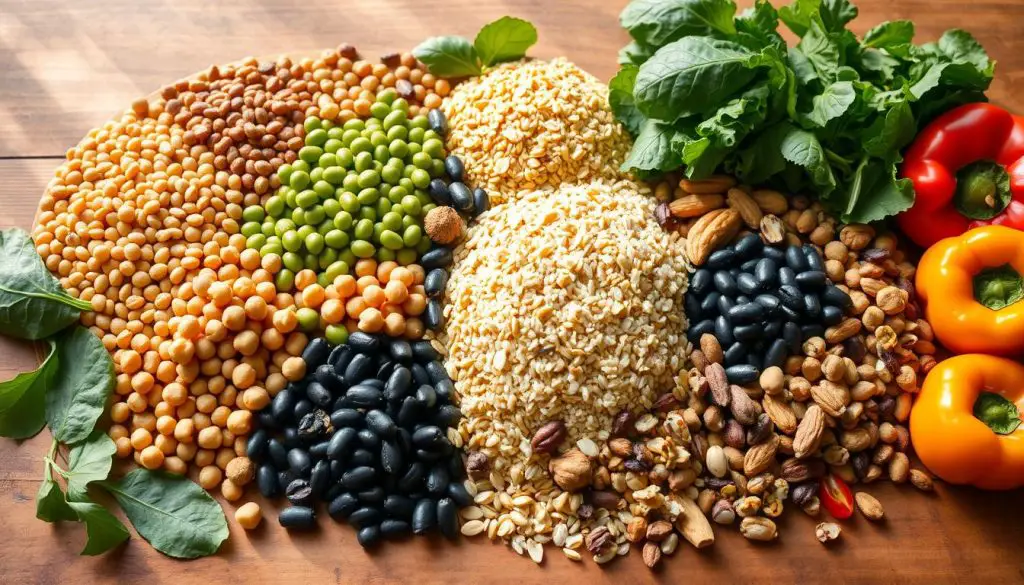
By exploring different plant-based proteins, vegetarians and vegans can easily meet their protein needs. With a bit of creativity, the options for protein-rich meals are limitless.
Nuts and Seeds: Compact Protein Packages
Incorporating protein-rich nuts and seeds into your diet can significantly enhance your health. These small, yet mighty protein-packed snacks are packed with nutrients. They support muscle maintenance and even gut health.
Top Protein-Rich Nuts and Their Benefits
Almonds, walnuts, and pistachios are among the most protein-dense nuts. Almonds are not just high in protein but also in healthy fats and fiber. They are a great protein for gut health, making them a versatile healthy protein option. Walnuts, on the other hand, are a rich source of plant-based omega-3s, which are good for the heart. Pistachios offer a satisfying crunch and a nutrient-rich profile, including antioxidants.
Optimal Portion Sizes for Maximum Benefits
- A serving of 1/4 cup of nuts or 2 tablespoons of seeds can provide a substantial protein boost.
- Incorporate nuts and seeds into your meals and snacks, such as sprinkling them on salads, yogurt, or oatmeal.
- Enjoy nuts and seeds in moderation, as they are calorie-dense and can contribute to weight gain if consumed in excess.
By making nuts and seeds a regular part of your diet, you can enjoy their protein-packed benefits. This supports overall health and wellness.
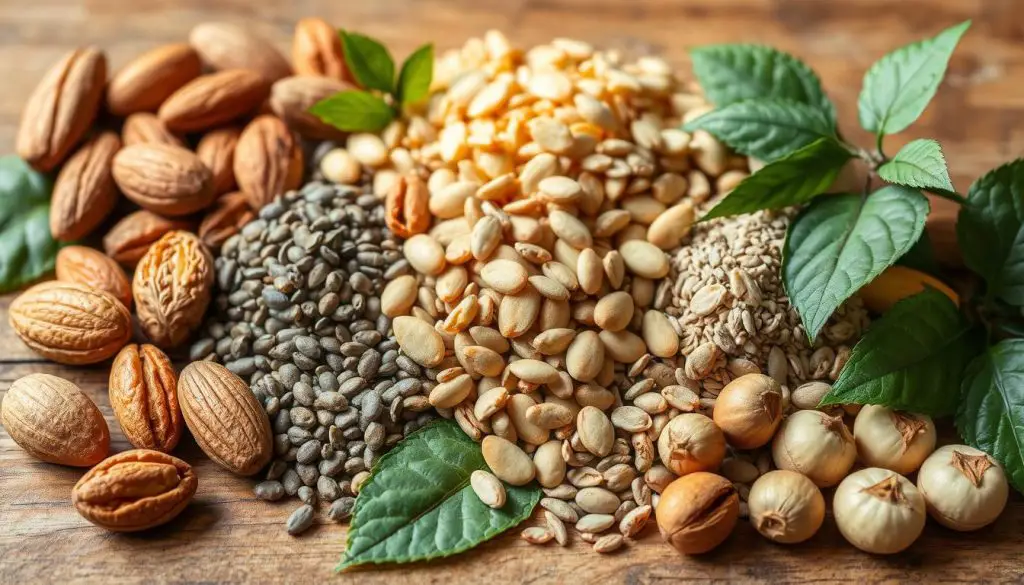
“Nuts and seeds are nature’s original superfood, providing a wealth of essential nutrients in a portable, easy-to-enjoy package.”
Legumes and Beans: Budget-Friendly Protein Sources
Legumes and beans are often overlooked when discussing protein-rich foods. Yet, they are nutritional powerhouses, offering a budget-friendly and accessible source of high-quality protein. This is beneficial for everyone, from active adults to health-conscious older adults.
Legumes, like lentils, chickpeas, black beans, and kidney beans, are loaded with protein. They support muscle maintenance, boost metabolism, and provide sustained energy. For instance, a single cup of cooked lentils boasts an impressive 18 grams of protein. This makes them a top choice for protein-rich meals for weight loss.
- Lentils: 18g protein per cup
- Chickpeas: 15g protein per cup
- Black beans: 15g protein per cup
- Kidney beans: 13g protein per cup
Legumes and beans are not just high in protein. They are also rich in fiber, complex carbohydrates, and essential vitamins and minerals. This makes them particularly beneficial as protein-rich foods for older adults, who may have specific dietary needs or challenges
“Incorporating legumes and beans into your diet is a simple and cost-effective way to boost your protein intake and support overall health.”
To fully benefit from these budget-friendly protein sources, try adding them to various dishes. From hearty stews and chilis to flavorful dips and salads, the possibilities are endless. With a bit of creativity, you can easily incorporate legumes and beans into your weekly meals. This will help you enjoy their protein for boosting metabolism and overall nutritional value.
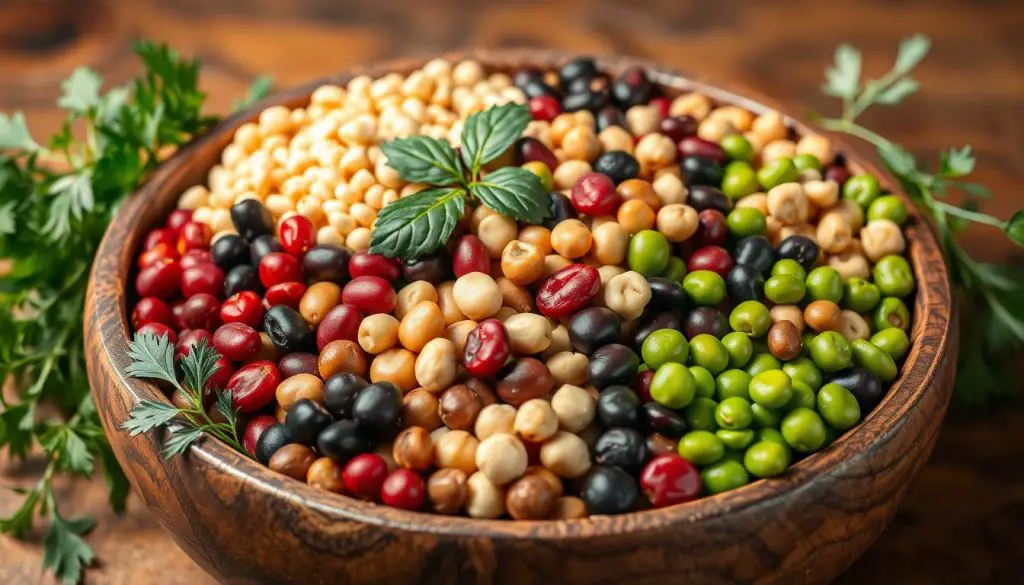
Quinoa and Other Protein-Rich Grains
Seeking to enhance your protein intake? The answer lies in quinoa and other protein-rich grains. These grains are not only high in protein but also rich in vitamins, minerals, and fiber. They play a crucial role in supporting your health and fitness objectives.
Quinoa stands out as a complete protein, encompassing all essential amino acids. It’s an excellent choice for those aiming for high-protein meals. Additionally, grains like buckwheat, amaranth, and teff can significantly increase your protein consumption. They are particularly beneficial for individuals involved in bodybuilding.
Cooking Tips for Perfect Protein-Rich Grains
To maximize the nutritional benefits of these grains, adhere to these straightforward cooking guidelines:
- Rinse quinoa before cooking to remove the bitter-tasting saponin coating.
- Use a 1:2 grain-to-liquid ratio when cooking quinoa and other grains.
- Simmer grains gently until they’re tender and the liquid is absorbed.
- Fluff cooked grains with a fork to keep them light and fluffy.
Meal Combination Ideas for Complete Protein
Combine protein-rich grains with other nutrient-dense foods to craft balanced, protein-rich meals. Here are some tasty combinations:
- Quinoa and roasted vegetables with grilled chicken
- Teff porridge with almond milk, berries, and nuts
- Buckwheat noodles with sautéed shrimp and leafy greens
- Amaranth and black bean burrito bowls
Incorporating these protein-rich grains into your diet will help you meet your daily protein requirements. This, in turn, supports your overall health and fitness goals.
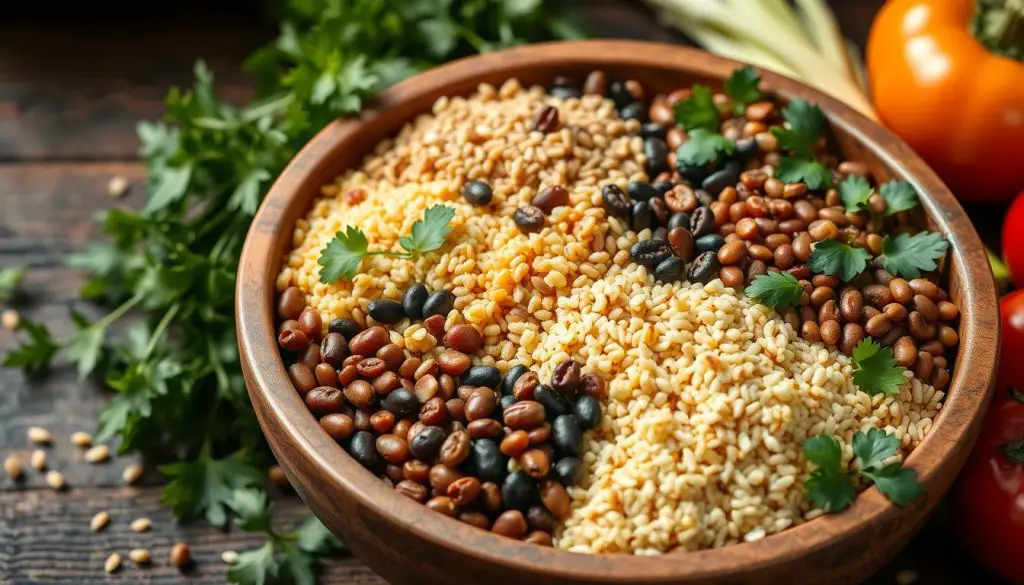
Conclusion
Incorporating a variety of protein-rich foods into your diet is crucial for a healthy lifestyle and achieving fitness goals. This includes lean meats, eggs, and plant-based options like legumes, beans, and protein-rich grains. The top 10 protein sources discussed in this article provide numerous nutritional benefits. They fuel your body and enhance overall well-being.
If you’re a fitness enthusiast aiming to boost recovery and muscle growth, or simply want to improve your overall health, focus on protein-rich foods. A balanced, varied diet that meets your daily protein needs can significantly impact your health. You’ll see benefits like increased energy, better immune function, and more.
The success of a protein-rich diet depends on finding the right mix of top protein foods that suit your taste and dietary needs. Listen to your body, try new recipes, and keep track of your protein intake. This approach supports your health and fitness journey in the long run.
FAQ
What are the best protein-rich foods for a healthy diet?
For a healthy diet, focus on lean meats, eggs, fish, and seafood. Greek yogurt and dairy products are also good. Don’t forget plant-based proteins like legumes and quinoa, along with nuts and seeds.
How much protein do I need in my daily diet?
Daily protein needs vary by age, activity level, and health. Generally, adults should aim for 0.8-1.2 grams of protein per kilogram of body weight daily.
What are the benefits of getting enough protein in my diet?
Protein supports muscle building, metabolism, and energy. It also keeps skin, hair, and nails healthy. Plus, it helps with weight management and exercise recovery.
How can I incorporate more lean meats into my diet?
Choose lean meats like chicken, turkey, and certain beef and pork cuts. Grill, bake, or sauté them. Pair with veggies and whole grains for a balanced meal.
What are the nutritional benefits of eggs?
Eggs are packed with essential amino acids and vitamins. They’re also rich in minerals and antioxidants. Enjoy them in omelets, baked goods, or as a snack.
How can I incorporate more fish and seafood into my diet?
Fish and seafood offer high-quality protein and omega-3s. Grill, bake, or sauté them. Add canned tuna or salmon to salads, sandwiches, or pasta.
What are some benefits of including Greek yogurt and other dairy products in my diet?
Greek yogurt and dairy are protein-rich, with calcium and probiotics. Enjoy them as snacks, in smoothies, or to boost meal protein.
How can I get enough protein on a vegetarian or vegan diet?
Legumes, beans, lentils, nuts, seeds, and quinoa are great for vegetarians and vegans. Mix these with complementary amino acids to meet daily protein needs.
What are the benefits of incorporating nuts and seeds into my diet?
Nuts and seeds are protein-rich, with healthy fats, fiber, and vitamins. Snack on them, add to meals, or use in baking to boost protein.
How can I use legumes and beans to increase my protein intake?
Legumes and beans are affordable, protein-rich, and nutritious. Add them to soups, stews, and dishes for protein-rich meals. They’re also great in salads and dips.
What are the benefits of including protein-rich grains like quinoa in my diet?
Quinoa and other grains are plant-based protein sources. Use them in bowls, salads, and pilafs. Combine with lean proteins, veggies, and fats for balanced meals.

